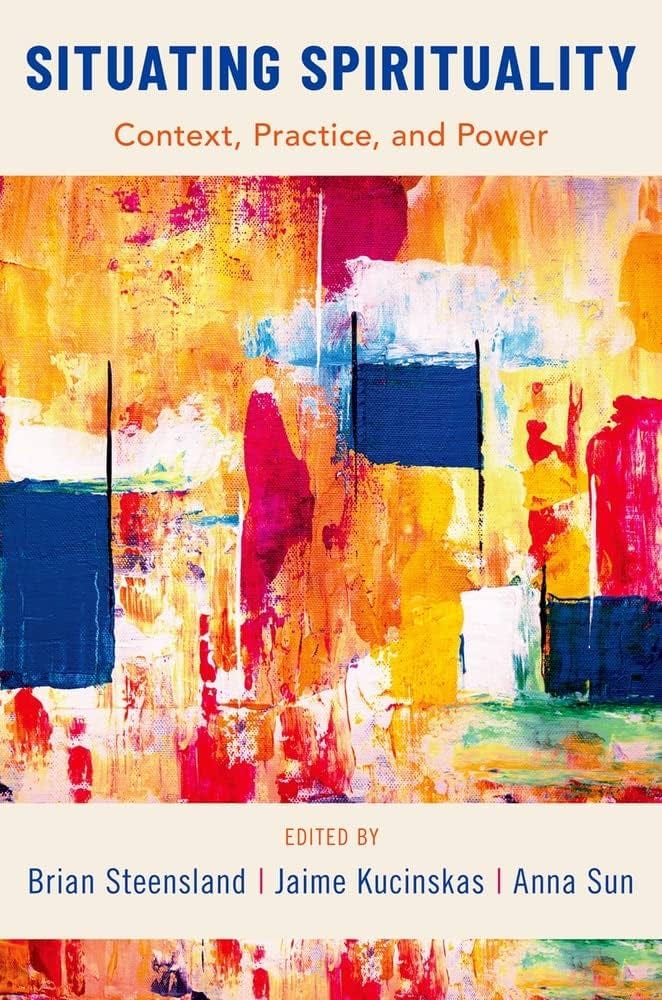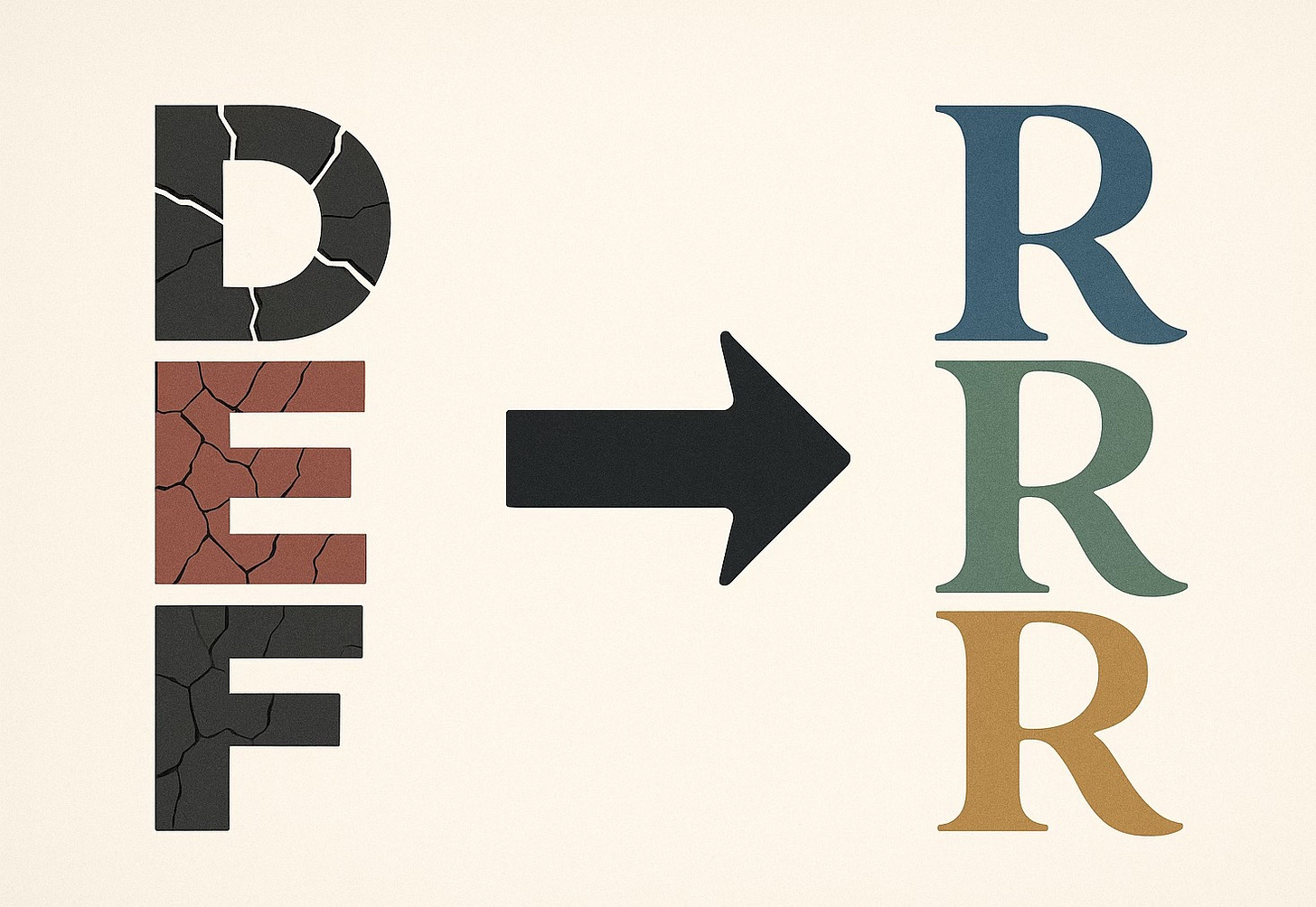Beyond the DEF logic
What scientists can teach us about spiritual intelligence
The following is a talk I presented at the Tangier Festival of the House of Beautiful Business in 2025. Thanks to Tim Leberecht for helpful feedback on an earlier version. I’d be grateful for comments and suggestions to develop this idea further.
Intelligence is a concept that we have come to associate with rationality and scientific thinking. Ask people for a name they’d associate with intelligence and you’re likely to get Einstein. This mode of intelligence has obviously brought about immense progress in terms of medicine and technology and quality of life. And we pride ourselves on this mode of intelligence: we look down on old, “backwards” societies steeped in superstition and ignorance. And yet, as the sociologist Max Weber argued more than a hundred years ago, this comes with a cost.
Weber saw science as a source of disenchantment. The project of modern science strips away from reality the sense of magic, mystery, and the sacred. And this logic is not just restricted to science; it’s been driving management for the past century as well, from scientific management of the 1900s to Zuckerberg’s mantra: “move fast and break things.” We see it in the breakneck speed at which AI is advancing along the same logic, accelerating the disenchantment of the world that Weber foresaw. And across our institutions in science, tech, and business, we see three drivers of disenchantment:
1. Domination: the imperative for control and mastery;
2. Extraction: the imperative to turn everything into a means-ends calculation to maximize utility; and
3.. Fragmentation: breaking things down, tearing things apart, hyperspecializing
But science and business are not fated to disenchant us. The problem is that Domination, Extraction, and Fragmentation (DEF) have become our unquestioned default settings. The DEF logic has drowned out another set of a deeper, contrary set of logics I’ve found at the heart of science.
As a sociologist, I’ve been studying scientists as a profession for more than a decade. In our research on thousands of scientists in several countries (see here, here, and here), we find that for them, the practice of science is far from disenchanting -- it’s a profound source of enchantment. Rather than depleting the sense of mystery and magic, science heightens it, deepens it. Scientific intelligence tells us how things work -- but because science is a human pursuit, it needs to be undergirded by an intelligence that gets at why things matter.
Spiritual intelligence is understood by psychologists as a set of capacities to (a) recognize ultimate meaning, intrinsic value, and transcendence; (b) integrate this into a coherent understanding of ourselves and the world; and then (c) translate it into wise action. I’m going to expand this definition a bit more sociologically by the end of this talk, but for now I want to focus on three key aspects of spiritual intelligence that I’ve found at work in the scientists I’ve studied: Reverence, Receptivity, and Reconnection. And these 3Rs are the opposite of the three default imperatives of the DEF logic.
1. Reverence: More than 80% of the scientists we surveyed regularly experience a profound sense of respect for what they learn. One Indian biologist shared with me a profound experience of reverence she experienced in the face of bacteria she studied:
"If I don't tell you that this is a bacterial needle [see image above on the left and the middle], you may easily mistake this for one of those beautiful stambhas [pillars] in archaeological sites. If you go to Hampi, you will see something like this. These beautiful needles precisely get tethered onto the bacteria. They make this kind of delivery-system needle, which if we even think of manufacturing, we may take ages to do so—and they do it within minutes. Outwardly you just think they're either cocci, round-shaped, or rod-shaped, but if you look at the cryo-electron microscopy of these structures, they are no less than beautiful pieces of art. If I were a painter, I could have drawn it. It is this beautiful.”
Think about this might be relevant in your own work: What is the hidden “temple pillar” – something or someone you normally treat as a resource to control, but could instead regard with deep reverence? What could be the consequence of doing so?
2. Receptivity: Again more than 80% of scientists we surveyed told us they regularly feel reality opens up new mysteries. They experience a profound sense of gratitude for the sheer givenness of things. Not everything can be turned into instrumental calculation. As one Italian biologist told us:
"When you encounter something you still can't fully explain scientifically — because science doesn't yet explain everything—then a sense of magic remains. A single human cell involves millions of coordinated processes. Billions of these cells harmoniously working together in our bodies — that’s breathtaking.”
I want you to think about how this might be relevant in your own work: Where, in the rush to optimize and deliver, could you dare to pause and sit with the mystery? Name one place in your current project where sitting with the unanswered, rather than forcing a quick solution, might open a richer path forward?
3. Reconnection: Science obviously cannot do without analysis and specialization. But if all we do is analyze, break things apart, we lose a sense of the bigger picture—it can leave us alienated, without a sense of where we fit into the story. We’ve met scientists who feel alienated in this way—”specialists without spirit,” as Weber put it. And yet, we’ve also spoken to scientists who find moments in their work that pull them out of the analytic mode into an experience of profound connection. One British scientist told us:
“I was on a boat and there was bioluminescence across the whole ocean. And when you were swimming in the water, your whole body glowed and the fish around you, would also glow the moment they moved... And that sense of understanding that all of those little glowing lights are individual organisms that are glowing for their own reasons.…That was a profound experience … that sense of I'm just this swirling part of this glowing tapestry, that's where I would say felt spiritual.… it felt spiritual just in that sense of being connected and being part of that whole tapestry of being and being a small, in that moment, an insignificant part of that tapestry of being.”

Think about how this might be relevant in your own work: Pause for a moment to think of everyone your work is connected to. See yourself as one pixel in a living mosaic. Now which relationship most needs your attention now to keep that mosaic intact? What first step could you take today to repair or deepen that link?
I hope this gives you at least a small taste of how cultivating these three spiritual principles can help you regain a sense of wonder, humility, and even transcendence in your work. But spiritual intelligence requires more than just recognizing and internalizing these principles; they also need to be translated into action.
And here, there’s a serious challenge we need to face: the separation of system and spirit.
The scientists we talked to have profound spiritual experiences, but they’re still stuck in a system that doesn’t value them: a system governed by the DEF logic. Domination, Extraction, Fragmentation fuel the publish-or-perish treadmill of science culture, the exploitation found in toxic cultures, and the misuse of science for damaging the environment. The same DEF logic has governed our economy—crushing rivals, raping the planet for short-term profit, treating people as widgets—is now turbo-charging the development of AI systems. OpenAI, for instance, which has come to dominate the AI space, defines intelligence as “highly autonomous systems that outperform humans at most economically valuable work,” explicitly equating intelligence with economic productivity and reinforcing the DEF logic.
The danger here is we end up treating spirituality as a private wellness hack while “real” decisions obey DEF imperatives. If we rely on an over-psychologized understanding of Spiritual Intelligence, the risk is it too falls prey to the DEF logic: it can be turned into a tool for gatekeeping and for perpetuating new forms of inequality. What recent sociological research on spirituality argues is we need to stop treating spirituality as an individual-level, context-free phenomenon that’s always positive and innocent. Instead, we need to recognize spirituality has a great deal to do with context, community, and power.
This means that:
1. even if spiritual intelligence can be defined in terms of universal principles (e.g., reverence or compassion), these would likely look different in different contexts;
2. spirituality is not an individualistic, atomistic thing, but is always shaped by community – from the norms and traditions that govern our practices to the spiritual exemplars that we imitate; and
3. spirituality is not innocent: it’s not always positive, it’s not immune to manipulation; it can be easily coopted.
Seen that way, we could prevent spiritual intelligence from becoming a means to some other end. Rather than letting it become instrumentalized as a ranking tool, what if it shapes the design criteria for new technologies? What might AI systems look like that were intentionally designing for reverence instead of domination, receptivity instead of extraction, reconnection instead of alienation? Is it possible to build
AI systems that can protect rather than exploit the planet?
AI models that confess limits, surface bias, and invite human judgment – and even nudge us to disconnect altogether on a regular basis?
AI tools that steer us towards real-life community and civic connection rather than preying on our loneliness?
Spiritual intelligence can’t be just about private meditation exercises. We need to understand it primarily as a relational capacity, orienting us towards ultimate meaning, intrinsic value, and interconnectedness, that is shaped by our cultures, contexts, and power structures. Its applications need to be discerned together with the people we’re serving, so that power serves reverence, receptivity, and reconnection, instead of hijacking or undermining them.
What could this look like in a business context? Can the 3Rs move beyond private spiritual practice to business policy? Possibly. Consider the following sorts of examples that some colleagues and I studied in developing the concept of Social Generativity:
1. Locconi Group, an Italian measurement and control systems manufacturer (ironically enough) exemplifies a sense of reverence for their employees: instead of chaining ex-employees with non-competes, it bankrolls their spin-offs, even if they grow into direct competitors;
2. Patagonia’s “Let My People Go Surfing” rule, or Vynamic’s ban on after-hours email, build intentional disengagement into the schedule;
3. Brunello Cucinelli, although producing designer clothing affordable only by mobsters, movie stars, and tech moguls, invests heavily in the local community, restoring the local village and paying for the training of local artisans.
These companies aren’t perfect but I want to highlight them as models of inspiration rather than practices to replicate; they show us what’s possible if we start to take our spiritual intelligence seriously.
Whether in science or business, our decisions are steering society in one direction or the other. The choice is ours to make: do we keep amplifying DEF reflexes until we finally can’t hear the planet or each other at all—or do we attune our systems to the deeper signal already humming in the best science: reverence, receptivity, reconnection?
If spiritual intelligence can re-enchant the science lab, it can re-enchant our algorithms. We have to decide which intelligence we want to encode into our future.






